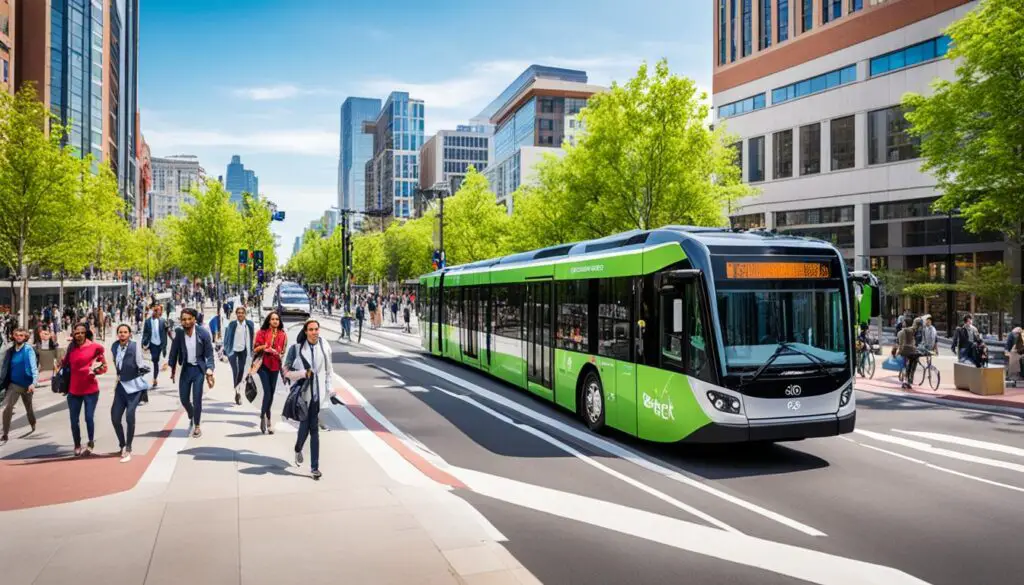Living sustainably has a significant impact on combatting climate change. By adopting environmentally friendly practices and making conscious choices in our daily lives, we can reduce our carbon footprint and contribute to a healthier planet.
From the food we eat to the way we travel, every decision we make can either contribute to or alleviate the effects of climate change. Sustainable living empowers individuals to take action and be part of the solution. By incorporating eco-friendly habits into our lifestyles, we can create a positive ripple effect that extends far beyond our own lives.
Key Takeaways
- Sustainable living plays a crucial role in combatting climate change.
- By adopting environmentally friendly practices, we can reduce our carbon footprint.
- Every decision we make can contribute to a healthier planet.
- Living sustainably empowers individuals to be part of the solution.
- Incorporating eco-friendly habits creates a positive ripple effect.
The Importance of Reducing Waste
Minimizing waste is a key aspect of sustainable living. By opting for reusable products, saying no to single-use plastics, and recycling materials such as paper, plastic, glass, and metal, we can greatly reduce environmental pollution and resource depletion.
“The greatest threat to our planet is the belief that someone else will save it.” – Robert Swan
Every small action we take to reduce waste has a significant impact on our environment. By choosing reusable products, such as reusable water bottles, bags, and coffee cups, we can decrease our reliance on single-use items that end up in landfills and contribute to pollution. Additionally, by saying no to single-use plastics like straws and plastic utensils, we can help combat the detrimental effects of plastic on our oceans and marine life.
Recycling plays a crucial role in waste reduction. When we recycle materials like paper, plastic, glass, and metal, we conserve energy and natural resources while diverting waste from landfills. Recycling also reduces the need for extracting new raw materials, which can have a significant environmental impact.
An example of the environmental impact of recycling is the production of recycled aluminum. Recycling aluminum saves approximately 95% of the energy required to produce it from raw materials. By recycling one aluminum can, we can save enough energy to power a television for up to three hours.
By incorporating sustainable practices, such as reducing waste through reusables and recycling, we can mitigate the negative environmental effects of waste accumulation. These small actions collectively make a difference in waste reduction and contribute to a more sustainable future for our planet.
The Environmental Impact of Waste Reduction
To truly understand the environmental impact of waste reduction, let’s examine the significant benefits it brings:
| Environmental Benefit | Description |
|---|---|
| Reduced Pollution | By reducing waste, we minimize the release of harmful pollutants into the air, water, and land, improving the overall quality of our environment. |
| Conserved Resources | Waste reduction helps conserve natural resources such as timber, water, and energy by reducing the need for raw material extraction and processing. |
| Preserved Habitats | By reducing waste, we protect natural habitats from destruction or degradation caused by waste disposal methods like landfills and incineration. |
| Reduced Greenhouse Gas Emissions | Waste decomposition in landfills produces greenhouse gases like methane, contributing to climate change. Waste reduction helps minimize these emissions. |
With these environmental benefits in mind, it becomes evident that waste reduction is not only essential for sustainable living but also for mitigating the broader environmental challenges we face, including climate change and resource depletion.
Energy Conservation for a Greener Future
Conserving energy is essential in building a sustainable lifestyle. By implementing simple practices, we can reduce our carbon footprint and contribute to a greener future. Here are some eco-friendly strategies for energy conservation:
1. Turn Off Lights and Appliances
One of the easiest ways to conserve energy is by switching off lights and appliances when they are not in use. By making it a habit to turn off lights when leaving a room and unplugging electronics when they are fully charged or not needed, we can significantly reduce electricity consumption.
2. Invest in Energy-Efficient Appliances
Another effective way to save energy is by investing in energy-efficient appliances. Look for products with the Energy Star label, which indicates that they meet strict efficiency guidelines. These appliances consume less energy and can help lower electricity bills while benefiting the environment.
3. Utilize Programmable Thermostats
A programmable thermostat allows you to set specific temperature schedules for different times of the day. By optimizing heating and cooling when you are not at home or while sleeping, you can save energy and create a more comfortable living environment.
“Conserving energy not only helps protect the environment but also leads to significant cost savings for households and businesses alike.”
Incorporating these energy conservation practices into our daily lives can have a meaningful impact on our eco-friendly lifestyle. By reducing energy consumption, we can contribute to a sustainable future powered by renewable energy sources.
Benefits of Energy Conservation
There are numerous benefits to practicing energy conservation:
- Reduced carbon footprint: Energy conservation plays a vital role in reducing greenhouse gas emissions, mitigating climate change, and preserving the planet for future generations.
- Lower energy costs: By consuming less energy, individuals and businesses can experience significant savings on energy bills, allowing for financial resources to be allocated elsewhere.
- Enhanced energy security: Conserving energy reduces dependence on fossil fuels and promotes the development and utilization of renewable energy sources, ensuring a more stable and sustainable energy future.
- Promotes eco-friendly habits: Engaging in energy conservation encourages individuals and communities to adopt a lifestyle that prioritizes sustainability and environmental responsibility.
- Supports renewable energy transition: With growing investments in renewable energy technologies, energy conservation acts as a complementary measure to maximize the utilization and benefits of renewable sources.
By embracing energy conservation practices, we can make a positive impact on the environment and contribute to a greener future.
Embracing a Plant-Based Diet for the Environment
Transitioning to a plant-based diet can have a profound impact on both personal health and the environment. By reducing the consumption of animal products that require large amounts of energy, land, and water, we can lower greenhouse gas emissions and promote sustainable food production.
Not only does a plant-based diet offer numerous health benefits such as improved heart health, weight management, and reduced risk of chronic diseases, but it also contributes to a greener planet.
“Let food be thy medicine and medicine be thy food.” – Hippocrates
Fruits, vegetables, whole grains, legumes, nuts, and seeds form the foundation of a plant-based diet. These nutrient-rich foods provide essential vitamins, minerals, and antioxidants while being low in saturated fats and cholesterol.
By embracing a plant-based lifestyle, individuals can make a significant positive impact on the environment. Take a look at the table below which highlights the environmental benefits of a plant-based diet:
| Environmental Impact of a Plant-Based Diet | |
|---|---|
| Reduced greenhouse gas emissions | Less energy-intensive than animal agriculture |
| Preservation of land and water resources | Animal agriculture requires vast amounts of land and water |
| Conservation of biodiversity | Reduces deforestation and habitat destruction for animal farming |
| Decreased water pollution | Plant-based agriculture produces less waste and runoff |
By choosing plant-based alternatives to traditional animal-based foods, individuals can play an active role in reducing their ecological footprint and contributing to a more sustainable future.
Embracing a plant-based diet not only benefits our own well-being but also the health of our planet. By making conscious choices in our food consumption, we can create a more sustainable world for future generations.
Sustainable Transportation for a Cleaner Future
When it comes to reducing carbon emissions and promoting eco-friendly travel, choosing sustainable transportation options is key. By opting for environmentally friendly modes of transportation such as walking, cycling, using public transport, and carpooling, we can significantly contribute to a cleaner future and a healthier planet.
Walking and cycling are not only great for the environment but also provide numerous health benefits. By using our own two feet or a bicycle, we can reduce our reliance on fossil fuels, decrease traffic congestion, and improve air quality in our communities. Additionally, incorporating physical activity into our daily commute promotes a healthier lifestyle.
Public transportation, such as buses, trains, and trams, plays a vital role in sustainable transportation. By using shared vehicles, we can reduce the number of cars on the road and decrease greenhouse gas emissions. Public transport networks also provide convenient and affordable travel options, improving accessibility for individuals and communities.
“The future of transportation is sustainable, and it starts with the choices we make today.”
Carpooling, or ridesharing, is another effective way to reduce carbon emissions. By sharing a vehicle with others who have a similar destination, we can reduce the number of cars on the road and lower our individual impact on the environment. Carpooling also offers opportunities for social interaction and cost sharing, making it a win-win situation for both the planet and our wallets.
Embracing sustainable transportation practices not only helps reduce carbon emissions and combat climate change but also contributes to cleaner air, decreased traffic congestion, and improved public health. By making conscious choices in our daily travel habits, we can pave the way for a greener future.
The Benefits of Sustainable Transportation:
- Reduces carbon emissions from vehicles
- Improves air quality and reduces pollution
- Decreases traffic congestion
- Promotes physical activity and a healthier lifestyle
- Enhances accessibility and affordability
- Builds stronger communities through shared transportation
The Role of Governments and Communities:
Creating a sustainable transportation system requires collaboration between governments, organizations, and individuals. Governments can incentivize the use of sustainable transportation by investing in public transport infrastructure, implementing policies that promote walking and cycling, and providing financial incentives for carpooling and other shared mobility options.
Communities play a crucial role in embracing sustainable transportation practices. By advocating for better pedestrian and cycling infrastructure, supporting public transportation initiatives, and organizing community carpooling programs, individuals can contribute to a cleaner and more sustainable future.
Water Conservation for Future Generations
Conserving water is vital for a sustainable future. By implementing simple strategies, we can contribute to reducing water wastage and ensuring the availability of this precious resource for future generations.
Fix Leaks:
One of the easiest ways to conserve water is to fix leaks promptly. A dripping faucet or a leaking pipe may seem insignificant, but over time, they can result in significant water wastage. Regularly check for leaks and repair them to prevent unnecessary water loss.
Install Low-Flow Fixtures:
Another effective practice is to install low-flow fixtures, such as faucets, showerheads, and toilets. These fixtures are designed to minimize water usage without compromising performance. By utilizing low-flow fixtures, you can reduce water consumption and contribute to water conservation.
Water Plants During Optimal Times:
When it comes to gardening, it’s important to water plants during optimal times to minimize water evaporation. Watering early in the morning or late in the evening allows the plants to absorb moisture efficiently, reducing the amount of water required. Additionally, consider using a drip irrigation system or a soaker hose to deliver water directly to the roots, avoiding unnecessary evaporation.
Collect Rainwater:
Rainwater harvesting is an environmentally friendly practice that can help conserve water and reduce reliance on other sources. Install a rain barrel or a larger rainwater harvesting system to collect and store rainwater. This collected water can then be utilized for activities such as watering plants or cleaning outdoor spaces, reducing the need for treated water from the tap.
By implementing these sustainable practices in our everyday lives, we can all contribute to reducing water wastage and ensuring a sustainable future for generations to come.
Conclusion
Embracing sustainable living is crucial for mitigating the impact of climate change and preserving our planet for future generations. By incorporating sustainable practices into our daily lives, we can make a tangible difference and reduce our environmental footprint.
Through waste reduction, we can minimize pollution and resource depletion. By opting for reusable products, saying no to single-use plastics, and recycling materials, we contribute to a healthier planet.
Conserving energy is another vital aspect of sustainable living. Simple actions like turning off lights and appliances when not in use, investing in energy-efficient devices, and utilizing programmable thermostats can lead to significant energy savings and a reduced carbon footprint.
Transitioning to a plant-based diet offers multiple benefits. Not only does it promote personal health, but it also reduces the environmental impact associated with animal agriculture, such as greenhouse gas emissions, deforestation, and water depletion.
Choosing sustainable modes of transportation, such as walking, cycling, or using public transport, can help reduce carbon emissions from vehicles. By embracing these eco-friendly options, we contribute to cleaner air and a healthier planet.
Lastly, practicing water conservation is essential for future generations. Simple strategies like fixing leaks, installing water-saving fixtures, and collecting rainwater can help minimize water wastage and ensure its availability for the years to come.
By committing to sustainable living, we can collectively create a greener world and mitigate the environmental impact of climate change. Let’s make sustainable choices and pave the way for a sustainable future.
FAQ
What is sustainable living and how does it impact climate change?
Sustainable living refers to adopting environmentally friendly practices and making conscious choices in our daily lives to reduce our carbon footprint. By minimizing waste, conserving energy, choosing a plant-based diet, embracing sustainable transportation, and practicing water conservation, we can significantly contribute to combatting climate change and creating a healthier planet.
How can I reduce waste and adopt sustainable practices?
To reduce waste, you can opt for reusable products, say no to single-use plastics, and recycle materials such as paper, plastic, glass, and metal. By adopting these practices, you can greatly minimize environmental pollution and resource depletion, promoting a more sustainable lifestyle.
What are some ways to conserve energy and live a more eco-friendly lifestyle?
Conserving energy can be achieved by simple actions such as turning off lights and appliances when not in use, investing in energy-efficient appliances, and utilizing programmable thermostats. These practices not only lead to significant energy savings but also help in reducing our carbon footprint and promoting renewable energy.
How does adopting a plant-based diet contribute to the environment?
Transitioning to a plant-based diet can have a profound impact on both personal health and the environment. By reducing the consumption of animal products that require large amounts of energy, land, and water, you can lower greenhouse gas emissions and promote sustainable food production. This shift towards a plant-based diet can significantly contribute to mitigating climate change.
What are some eco-friendly modes of transportation to reduce carbon emissions?
Choosing environmentally friendly modes of transportation such as walking, cycling, using public transport, and carpooling can significantly reduce carbon emissions from vehicles. By embracing these practices, you can contribute to cleaner air, reduce traffic congestion, and promote a healthier planet.
How can I practice water conservation in my daily life?
Conserving water is essential for a sustainable future. Simple strategies like fixing leaks, installing low-flow fixtures, watering plants during optimal times, and collecting rainwater can help minimize water wastage and ensure its availability for future generations. By adopting these practices, you can play a vital role in preserving this precious resource.
Why is embracing sustainable living crucial in mitigating climate change?
Embracing sustainable living is crucial in combatting climate change as it allows us to reduce waste, conserve energy, adopt a plant-based diet, utilize eco-friendly transportation, and practice water conservation. By making these conscious choices, we can make a tangible difference for our planet’s future, contributing to a greener world for generations to come.



